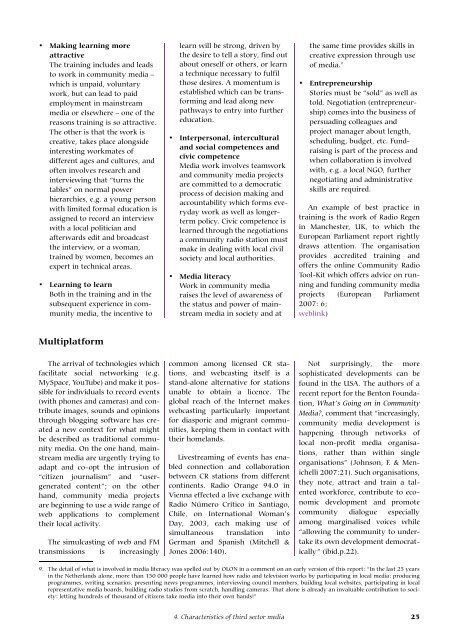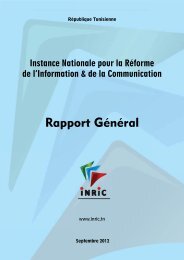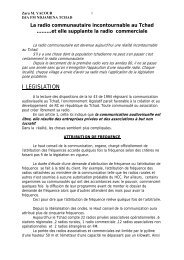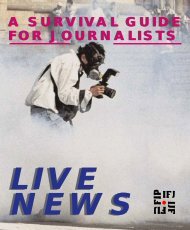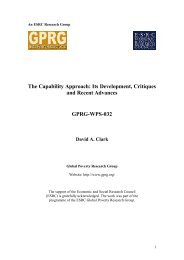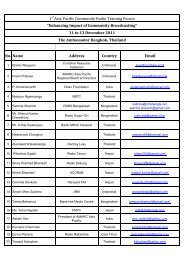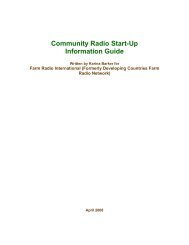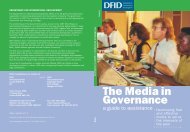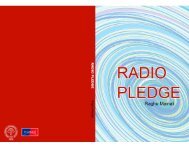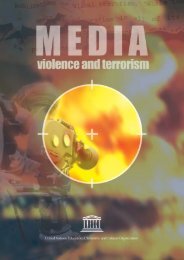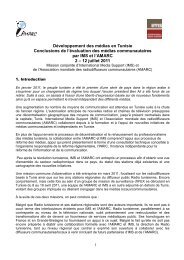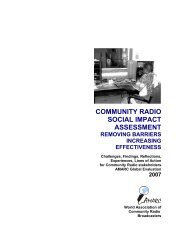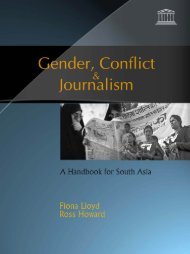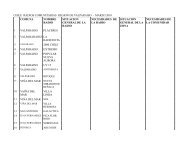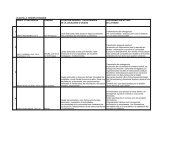sector by <strong>the</strong> same Griffith Universityresearch group (Forde etal 2002), it complements andtests <strong>the</strong> findings <strong>of</strong> quantitativeaudience research, <strong>the</strong> McNairIngenuity questionnaire study,using focus groups and qualitativemethods.2. Both <strong>the</strong> 2002 and 2007 studieswere financed by an impressivecollaboration <strong>of</strong> academic, government,sector and user organisations.Support came from <strong>the</strong>Australian Research Council, <strong>the</strong>Community Broadcasting Foundation(<strong>the</strong> body which distributesfederal funding to <strong>the</strong>sector), <strong>the</strong> Federal Department<strong>of</strong> Communication, InformationTechnology and <strong>the</strong> Arts, and <strong>the</strong>representative associations <strong>of</strong> <strong>the</strong>third sector, <strong>the</strong> CommunityBroadcasting Association <strong>of</strong> Australiaand its indigenous and ethniccounterparts.Public pr<strong>of</strong>ile <strong>of</strong> <strong>the</strong> sectorAt a recent international colloquiumin London, 7<strong>the</strong>re was generalagreement that more accessiblesummaries <strong>of</strong> research into <strong>the</strong>impact <strong>of</strong> <strong>community</strong> <strong>media</strong> neededto be made available, that <strong>the</strong> successes<strong>of</strong> <strong>community</strong> <strong>media</strong>,whe<strong>the</strong>r confirmed by formalresearch or not, should be morewidely publicised, and that <strong>the</strong> caseshould be made for recognising<strong>community</strong> <strong>media</strong> as a form <strong>of</strong>public service.AMARC’s recent Community RadioSocial Impact Assessment agrees:“Community radio achievementsare not properly highlighted and/ordisseminated […] in spite <strong>of</strong> a largebody <strong>of</strong> evidence on <strong>community</strong>radio <strong>social</strong> impact, CR practitionersand stakeholders have not taken <strong>the</strong>time and <strong>the</strong> efforts needed topresent systematically <strong>the</strong> achievements<strong>of</strong> <strong>community</strong> radio worldwide.”(AMARC 2007: 38)The point about <strong>the</strong> need for ahigher pr<strong>of</strong>ile for <strong>the</strong> sector is confirmedby several <strong>of</strong> <strong>the</strong> recommendations<strong>of</strong> <strong>the</strong> European Parliamentstudy which identified:• The need for increased networkingand knowledge exchangebetween CM organisations andassociations.• The need for more continuousrepresentation at EU level inorder to develop a public pr<strong>of</strong>ile<strong>of</strong> <strong>the</strong> sector.(European Parliament 2007:52)Training and lifelong learningAn important contribution to lifelonglearning is made by <strong>the</strong> thirdsector <strong>media</strong>. The chance to workwith <strong>media</strong> attracts people in <strong>the</strong> <strong>role</strong><strong>of</strong> volunteers who are <strong>of</strong>ten notreached by formal educational systems,or whose original educationalexperience was a disappointment.The presence <strong>of</strong> volunteers workingin <strong>community</strong> <strong>media</strong> is part <strong>of</strong><strong>the</strong> raison d’être <strong>of</strong> <strong>the</strong> sector: itensures that <strong>the</strong> <strong>community</strong> is representedat <strong>the</strong> heart <strong>of</strong> <strong>the</strong> project.Training is, <strong>the</strong>n, an integral part <strong>of</strong><strong>the</strong> operation. A survey conductedfor AMARC-Europe in <strong>the</strong> mid-1990s estimated that between40 000 to 50 000 people were workingin <strong>the</strong> <strong>community</strong> radio sector incountries <strong>of</strong> <strong>the</strong> EU, and commentedthat “<strong>the</strong> significance [<strong>of</strong> training] isincreasing as <strong>the</strong> effects <strong>of</strong> freemarket competition weaken <strong>the</strong>training provision which has been atraditional feature <strong>of</strong> <strong>the</strong> [mainstream]industry” (Lewis 1994). Insupplying <strong>the</strong> mainstream withtrained recruits, <strong>the</strong> sector couldjustifiably claim to be a “gateway toemployment”.But <strong>the</strong> sector’s contribution to<strong>the</strong> mainstream in this area is notnearly as significant as <strong>the</strong> widerand longer-term effects <strong>of</strong> <strong>community</strong><strong>media</strong> training which should beconsidered as coming under <strong>the</strong> category<strong>of</strong> lifelong learning. As arecent publication on <strong>the</strong> empoweringeffect <strong>of</strong> <strong>community</strong> <strong>media</strong>training puts it:“Those whose opinions are rarelygiven a hearing may have forgotten,or never learned, how to express<strong>the</strong>m. If technical training is combinedwith research, production andpresentation skills, which <strong>community</strong>radio routinely <strong>of</strong>fers, <strong>the</strong> experiencecan also equip people with a self-confidencethat is motivating. It can leadto employment – not necessarily in<strong>the</strong> <strong>media</strong> – and a fuller participationin today’s information society.”(Lewis & Jones 2006:6)More specific skills, whose acquisitioncan lead to fur<strong>the</strong>r educationalexperience or to formalemployment opportunities, havebeen summarised 8 as:• Skills for <strong>the</strong> knowledgesocietyWorking in <strong>the</strong> <strong>media</strong> isattractive to all ages, so <strong>the</strong>prospect <strong>of</strong> training in <strong>media</strong>skills brings in many people whohave had limited education and/or a poor experience <strong>of</strong> it. Digitalskills are a necessary part <strong>of</strong>production and use <strong>of</strong> <strong>the</strong> webfor programme researchintroduces and improvesresearch skills. Nei<strong>the</strong>r can beexploited without <strong>social</strong> andcommunicative skills.Acquisition <strong>of</strong> all <strong>the</strong>se skillsbrings self-confidence and all aretransferable to <strong>social</strong> andemployment settings in aknowledge society.7. See here where a link will be provided to <strong>the</strong> report <strong>of</strong> <strong>the</strong> colloquium when it is available.8. By META-Europe, a <strong>media</strong> training consortium with partners in seven European countries and experience in education and training, broadcastingand academic <strong>media</strong> research. See here where <strong>the</strong>re is a link to previous projects funded under <strong>the</strong> EU’s adult education programmeSocrates - “Creating Community Voices” and “Digital Dialogues” (weblink), <strong>the</strong> projects whose experience is reported in Lewis & Jones 2006,cited above.24 <strong>Promoting</strong> <strong>social</strong> <strong>cohesion</strong>: <strong>the</strong> <strong>role</strong> <strong>of</strong> <strong>community</strong> <strong>media</strong>
• Making learning moreattractiveThe training includes and leadsto work in <strong>community</strong> <strong>media</strong> –which is unpaid, voluntarywork, but can lead to paidemployment in mainstream<strong>media</strong> or elsewhere – one <strong>of</strong> <strong>the</strong>reasons training is so attractive.The o<strong>the</strong>r is that <strong>the</strong> work iscreative, takes place alongsideinteresting workmates <strong>of</strong>different ages and cultures, and<strong>of</strong>ten involves research andinterviewing that “turns <strong>the</strong>tables” on normal powerhierarchies, e.g. a young personwith limited formal education isassigned to record an interviewwith a local politician andafterwards edit and broadcast<strong>the</strong> interview, or a woman,trained by women, becomes anexpert in technical areas.• Learning to learnBoth in <strong>the</strong> training and in <strong>the</strong>subsequent experience in <strong>community</strong><strong>media</strong>, <strong>the</strong> incentive tolearn will be strong, driven by<strong>the</strong> desire to tell a story, find outabout oneself or o<strong>the</strong>rs, or learna technique necessary to fulfilthose desires. A momentum isestablished which can be transformingand lead along newpathways to entry into fur<strong>the</strong>reducation.• Interpersonal, interculturaland <strong>social</strong> competences andcivic competenceMedia work involves teamworkand <strong>community</strong> <strong>media</strong> projectsare committed to a democraticprocess <strong>of</strong> decision making andaccountability which forms everydaywork as well as longertermpolicy. Civic competence islearned through <strong>the</strong> negotiationsa <strong>community</strong> radio station mustmake in dealing with local civilsociety and local authorities.• Media literacyWork in <strong>community</strong> <strong>media</strong>raises <strong>the</strong> level <strong>of</strong> awareness <strong>of</strong><strong>the</strong> status and power <strong>of</strong> mainstream<strong>media</strong> in society and at<strong>the</strong> same time provides skills increative expression through use<strong>of</strong> <strong>media</strong>. 9• EntrepreneurshipStories must be “sold” as well astold. Negotiation (entrepreneurship)comes into <strong>the</strong> business <strong>of</strong>persuading colleagues andproject manager about length,scheduling, budget, etc. Fundraisingis part <strong>of</strong> <strong>the</strong> process andwhen collaboration is involvedwith, e.g. a local NGO, fur<strong>the</strong>rnegotiating and administrativeskills are required.An example <strong>of</strong> best practice intraining is <strong>the</strong> work <strong>of</strong> Radio Regenin Manchester, UK, to which <strong>the</strong>European Parliament report rightlydraws attention. The organisationprovides accredited training and<strong>of</strong>fers <strong>the</strong> online Community RadioTool-Kit which <strong>of</strong>fers advice on runningand funding <strong>community</strong> <strong>media</strong>projects (European Parliament2007: 6;weblink)MultiplatformThe arrival <strong>of</strong> technologies whichfacilitate <strong>social</strong> networking (e.g.MySpace, YouTube) and make it possiblefor individuals to record events(with phones and cameras) and contributeimages, sounds and opinionsthrough blogging s<strong>of</strong>tware has createda new context for what mightbe described as traditional <strong>community</strong><strong>media</strong>. On <strong>the</strong> one hand, mainstream<strong>media</strong> are urgently trying toadapt and co-opt <strong>the</strong> intrusion <strong>of</strong>“citizen journalism” and “usergeneratedcontent”; on <strong>the</strong> o<strong>the</strong>rhand, <strong>community</strong> <strong>media</strong> projectsare beginning to use a wide range <strong>of</strong>web applications to complement<strong>the</strong>ir local activity.The simulcasting <strong>of</strong> web and FMtransmissions is increasinglycommon among licensed CR stations,and webcasting itself is astand-alone alternative for stationsunable to obtain a licence. Theglobal reach <strong>of</strong> <strong>the</strong> Internet makeswebcasting particularly importantfor diasporic and migrant communities,keeping <strong>the</strong>m in contact with<strong>the</strong>ir homelands.Livestreaming <strong>of</strong> events has enabledconnection and collaborationbetween CR stations from differentcontinents. Radio Orange 94.0 inVienna effected a live exchange withRadio Número Crítico in Santiago,Chile, on International Woman’sDay, 2003, each making use <strong>of</strong>simultaneous translation intoGerman and Spanish (Mitchell &Jones 2006:140).Not surprisingly, <strong>the</strong> moresophisticated developments can befound in <strong>the</strong> USA. The authors <strong>of</strong> arecent report for <strong>the</strong> Benton Foundation,What’s Going on in CommunityMedia?, comment that “increasingly,<strong>community</strong> <strong>media</strong> development ishappening through networks <strong>of</strong>local non-pr<strong>of</strong>it <strong>media</strong> organisations,ra<strong>the</strong>r than within singleorganisations” (Johnson, F. & Menichelli2007:21). Such organisations,<strong>the</strong>y note, attract and train a talentedworkforce, contribute to economicdevelopment and promote<strong>community</strong> dialogue especiallyamong marginalised voices while“allowing <strong>the</strong> <strong>community</strong> to undertakeits own development democratically”(ibid.p.22).9. The detail <strong>of</strong> what is involved in <strong>media</strong> literacy was spelled out by OLON in a comment on an early version <strong>of</strong> this report: “In <strong>the</strong> last 25 yearsin <strong>the</strong> Ne<strong>the</strong>rlands alone, more than 150 000 people have learned how radio and television works by participating in local <strong>media</strong>: producingprogrammes, writing scenarios, presenting news programmes, interviewing council members, building local websites, participating in localrepresentative <strong>media</strong> boards, building radio studios from scratch, handling cameras. That alone is already an invaluable contribution to society:letting hundreds <strong>of</strong> thousand <strong>of</strong> citizens take <strong>media</strong> into <strong>the</strong>ir own hands!”4. Characteristics <strong>of</strong> third sector <strong>media</strong> 25


